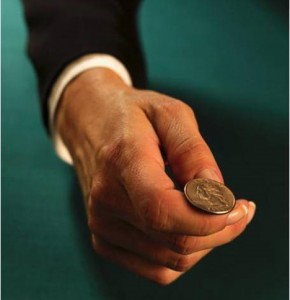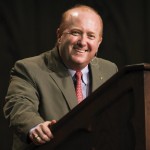Dr. J. I. Packer gives sound advice to the would be Christian writer:
Monthly Archives: August 2012
NOT the end of the world
My Lord, I did not choose You
Josiah Conder, 1836.
My Lord, I did not choose You,
For that could never be;
My heart would still refuse You,
Had You not chosen me.
You took the sin that stained me,
You cleansed me, made me new;
Of old You have ordained me,
That I should live in You.
Unless Your grace had called me
And taught my op’ning mind,
The world would have enthralled me,
To heav’nly glories blind.
My heart knows none above You;
For Your rich grace I thirst;
I know that if I love You,
You must have loved me first.
Justification (Quote)
 At the very heart of the controversy in the sixteenth century was the question of the ground by which God declares anyone righteous in His sight. The psalmist asked, “If you, O Lord, should mark iniquities, O Lord, who could stand?” (Ps. 130:3). In other words, if we have to stand before God and face His perfect justice and perfect judgment of our performance, none of us would be able to pass review. We all would fall, because as Paul reiterates, all of us have fallen short of the glory of God (Rom. 3:23). So, the pressing question of justification is how can an unjust person ever be justified in the presence of a righteous and holy God?
At the very heart of the controversy in the sixteenth century was the question of the ground by which God declares anyone righteous in His sight. The psalmist asked, “If you, O Lord, should mark iniquities, O Lord, who could stand?” (Ps. 130:3). In other words, if we have to stand before God and face His perfect justice and perfect judgment of our performance, none of us would be able to pass review. We all would fall, because as Paul reiterates, all of us have fallen short of the glory of God (Rom. 3:23). So, the pressing question of justification is how can an unjust person ever be justified in the presence of a righteous and holy God?
The Roman Catholic view is known as analytical justification. This means that God will declare a person just only when, under His perfect analysis, He finds that he is just, that righteousness is inherent in him. The person cannot have that righteousness without faith, without grace, and without the assistance of Christ. Nevertheless, in the final analysis, true righteousness must be present in the soul of a person before God will ever declare him just.
Whereas the Roman view is analytical, the Reformation view is that justification is synthetic. A synthetic statement is one in which something new is added in the predicate that is not contained in the subject. If I said to you, “The bachelor was a poor man,” I have told you something new in the second part of the sentence that was not already contained in the word bachelor. All bachelors are men by definition, but not all bachelors are poor men. There are many wealthy bachelors. Poverty and wealth are concepts that are not inherent in the idea of bachelorhood. So, when we say, “The bachelor was a poor man,” there is a synthesis, as it were.
When we say that the Reformation view of justification is synthetic, we mean that when God declares a person to be just in His sight, it is not because of what He finds in that person under His analysis. Rather, it is on the basis of something that is added to the person. That something that is added, of course, is the righteousness of Christ. This is why Luther said that the righteousness by which we are justified is extra nos, meaning “apart from us” or “outside of us.” He also called it an “alien righteousness,” not a righteousness that properly belongs to us, but a righteousness that is foreign to us, alien to us. It comes from outside the sphere of our own behavior. With both of these terms, Luther was speaking about the righteousness of Christ.
Excerpt adapted from R.C. Sproul’s latest book, Are We Together? Available now from ReformationTrust.com
I believe…
 The sixty-six books of the Protestant canon, in their original writings, comprise the verbally inspired, inerrant Word of God. The thirty-nine books known as the Hebrew Old Testament are God-breathed, products of the Holy Spirit’s inspiration, and thus free from error in all that they affirm (cf. Deuteronomy 18:18, 19; Psalms 19:7, 8; 119:89, 142, 151, 160; Matthew 5:17-19; John 10:35; 2 Timothy 3:16; 2 Peter 1:20, 21). Similarly, the twenty-seven books known as the Greek New Testament are the eternally abiding words of Jesus Christ (Matthew 24:35), and are thus the words of God (John 7:16; 12:49). The Holy Spirit enabled the writers both to recall what the Lord said (John 14:26), and to continue to receive His revelation (John 16: 12-15). As a result, the writings of the New Testament are the commandment of the Lord (1 Corinthians 14:37), are Scripture (2 Peter 3:15, 16), and are God-breathed (2 Timothy 3:16). For this reason, the sinner finds the way of salvation through Scripture (Romans 10:17; 2 Timothy 3:15; Hebrews 2: 1-3). The believer is made fruitful (Psalm 1:2, 3) and successful in the will of God (Joshua 1:8), warned and kept from sin (Psalms 19:11; 119:9,11), made holy (John 17:17), given wisdom (Psalm 9:7) and freeing knowledge of the truth (John 8: 31, 32), taught the fear of God (Psalm 119:38), counseled (Psalm 119:24), taught, reproved, corrected, and disciplined in the way righteousness (2 Timothy 3:16) by Scripture. Scripture is, in short, the fully adequate revelation of the person, ways, and will of God, the only infallible rule of faith for the people of God.
The sixty-six books of the Protestant canon, in their original writings, comprise the verbally inspired, inerrant Word of God. The thirty-nine books known as the Hebrew Old Testament are God-breathed, products of the Holy Spirit’s inspiration, and thus free from error in all that they affirm (cf. Deuteronomy 18:18, 19; Psalms 19:7, 8; 119:89, 142, 151, 160; Matthew 5:17-19; John 10:35; 2 Timothy 3:16; 2 Peter 1:20, 21). Similarly, the twenty-seven books known as the Greek New Testament are the eternally abiding words of Jesus Christ (Matthew 24:35), and are thus the words of God (John 7:16; 12:49). The Holy Spirit enabled the writers both to recall what the Lord said (John 14:26), and to continue to receive His revelation (John 16: 12-15). As a result, the writings of the New Testament are the commandment of the Lord (1 Corinthians 14:37), are Scripture (2 Peter 3:15, 16), and are God-breathed (2 Timothy 3:16). For this reason, the sinner finds the way of salvation through Scripture (Romans 10:17; 2 Timothy 3:15; Hebrews 2: 1-3). The believer is made fruitful (Psalm 1:2, 3) and successful in the will of God (Joshua 1:8), warned and kept from sin (Psalms 19:11; 119:9,11), made holy (John 17:17), given wisdom (Psalm 9:7) and freeing knowledge of the truth (John 8: 31, 32), taught the fear of God (Psalm 119:38), counseled (Psalm 119:24), taught, reproved, corrected, and disciplined in the way righteousness (2 Timothy 3:16) by Scripture. Scripture is, in short, the fully adequate revelation of the person, ways, and will of God, the only infallible rule of faith for the people of God.
All Hail the Power of Chance?
 Here’s an idea: A long long time ago there was something really, really, really small. It was so small that.. well, it was smaller than small could almost possibly be – a single unit of matter… small, reaaaaalllllyy small, get it?? Yeah, small!!
Here’s an idea: A long long time ago there was something really, really, really small. It was so small that.. well, it was smaller than small could almost possibly be – a single unit of matter… small, reaaaaalllllyy small, get it?? Yeah, small!!
Well, this really, really small thing, suddenly one Thursday at around 3 o’clock in the afternoon, just by chance exploded with a very, very, very big bang and…. lo and behold… became everything that now is – you know, the universe and everything in it.
Yes… and over a very, very long period of time this single unit of matter, without any personality, without intelligence and without even emotion, became personality, intelligence, emotion, retinas, livers, brain stems, backbones, blood vessels, mountain lions, electric eels, planets, stars, dandelions, colorful rainbows, snowflakes, waterfalls, woodpeckers, DNA, grizzly bears and stuff.
Yeah, its a totally amazing thing – this thing called chance. We owe everything.. and I mean everything, to chance. Yes, chance rolled the dice and “whammo!,” here we are and here is everything else too. All hail the power of chance!!!!
Except that… chance is actually not a thing; its a word used to describe mathematical probabilities.
Think about that for a moment…
Let’s take the flipping of a coin.. you know, a regular coin with heads on one side and tails on the other.
 Let’s ask ourselves, “what is the chance that if we flip this coin, it will come up either heads or tails?”
Let’s ask ourselves, “what is the chance that if we flip this coin, it will come up either heads or tails?”
Actually the answer is that there is a 100% chance that it will come up either heads or tails.
What is the chance that when we flip it, it will come up tails?
Answer: 50%, right?
OK, now ask youself this question: “What kind of power does chance have to actually MAKE the coin come up heads?”
Hmmmm – the right answer is, “no power at all.”
Why is that?
Because ‘chance’ is not actually a thing. It has no power. It has no mind. It has no will. It has no personality. It has no ability to change or alter anything. It is no thing.
Say the words “no thing” fast… what have you got?
No… thing! Nothing!
Chance is nothing.
hmmmmmm….
oh, and where exactly did this very, very, very small thing come from anyway? Where was it before it was?
Huh?
Yeah – where was this very, very, small thing hiding exactly?
Where did it come from? You know, before it ever grew to become really, really small?
What was it?
hmmmmmmm…
yeah! … ever stopped to ask yourself that?.. ever wondered why “scientists” don’t ever ask that question? Could it be because, they really don’t want to ask that question?
hmmmm…. Just a thought!
Well anyway, there’s this second idea. Are you ready for it?
I warn you that some people may not like it… but OK, here it is… its the idea that when there was absolutely no thing, yes… nothing around, can you picture it in your mind?
Yeah, imagine a whole lot of nothing.
Actually, you can’t have a whole lot of nothing.. because nothing is not a thing… and it gets worse… if there ever was a time when there was absolutely nothing.. all there could possibly be now is.. nothing…
What do I mean?
Well again lets try to imagine nothing… that’s hard to do… but as a concept – there’s nothing – and you leave it for 10 minutes… what will it become?
Nothing, right?
Leave nothing alone for 10 years. What will happen?
hmmm the same… nothing, right?
10 billion years?
Yes, same result…
Nothing is still nothing, no matter how much time you give it… Time does not help nothing’s cause….
and actually time is something anyway…
… the point here is that if nothing is ever to become something… time does not help it get there.
Anyway, back to this second idea…
When there was nothing except the God who always was.. yes this Personal God who has infinite power and infinite intelligence.. this God said, “Let there be.. and there it was….”
hmmmmm…
It seems to me that only one of these two ideas makes any kind of sense… and here’s a clue, it ain’t the first one.
If, however, you believe “chance” is what got all of us here, then bow down and worship it. But if you do, just remember, you’d be worshiping nothing at all because chance is not a thing. Its not even a quarter of the way to becoming something… Chance will not eventually evolve into something (if given enough time)…
Yes, there’s not even a chance!
Romans 1:18 For the wrath of God is revealed from heaven against all ungodliness and unrighteousness of men, who by their unrighteousness suppress the truth. 19 For what can be known about God is plain to them, because God has shown it to them. 20 For his invisible attributes, namely, his eternal power and divine nature, have been clearly perceived, ever since the creation of the world, in the things that have been made. So they are without excuse. 21 For although they knew God, they did not honor him as God or give thanks to him, but they became futile in their thinking, and their foolish hearts were darkened. 22 Claiming to be wise, they became fools…

The Sacraments (2)
 Some notes and reflections on the Sacraments:
Some notes and reflections on the Sacraments:
The protests of those wishing to bring reform to the Roman Catholic Church in the 16th Century (in what we now call the Protestant Reformation) highlighted two central issues: firstly (the formal issue), that which is God breathed, namely holy Scripture alone, is the sole infallible rule of faith for the people of God (Sola Scriptura); secondly, (the material issue), that justification before God (to be declared in right standing with God by God) is by faith alone (sola fide).
The Two Views Contrasted:
Roman Catholic View: The Church gives us the word of God and she is the authority to inform/instruct us as to what it teaches
Protestant View: The word of God creates the Church and the Church receives and submits herself to it.
“…have you not read what was spoken to you by God…” – Jesus Christ (Matt. 22:31)
“In the empire of the church, the ruler is God’s Word.” – Martin Luther – Works, Vol. 41, p. 134.
“I have learned to ascribe the honor of infallibility only to those books that are accepted as canonical. I am profoundly convinced that none of these writers has erred. All other writers, however they may have distinguished themselves in holiness or in doctrine, I read in this way. I evaluate what they say, not on the basis that they themselves believe that a thing is true, but only insofar as they are able to convince me by the authority of the canonical books or by clear reason.” – Martin Luther
“Since the church is Christ’s Kingdom, and he reigns by his Word alone, will it not be clear to any man that those are lying words by which the Kingdom of Christ is imagined to exist apart from his scepter (that is, his most holy Word)?” – John Calvin, Institutes
On the basis of the word of God then we discuss the sacraments which are seals and confirmations of the Word (visible Word).
Rom 4:9 Is this blessing then only for the circumcised, or also for the uncircumcised? For we say that faith was counted to Abraham as righteousness. 10 How then was it counted to him? Was it before or after he had been circumcised? It was not after, but before he was circumcised. 11 He received the sign of circumcision as a seal of the righteousness that he had by faith while he was still uncircumcised. The purpose was to make him the father of all who believe without being circumcised, so that righteousness would be counted to them as well…
Continue reading
Friday Round Up
 (1) If you missed any of the blog entries here this week, you might have missed the hurriedly arranged radio interview I did on Tuesday. 000 miles a year; that’s 300 hours! Brian Tracy taught me early to turn my car into a mobile classroom. Listen to instructional CDs as you drive and each year is the equivalent of two semesters of an advanced degree. Combined with a reading routine, you can separate yourself from the herd of average, CD by CD, book by book!”
(1) If you missed any of the blog entries here this week, you might have missed the hurriedly arranged radio interview I did on Tuesday. 000 miles a year; that’s 300 hours! Brian Tracy taught me early to turn my car into a mobile classroom. Listen to instructional CDs as you drive and each year is the equivalent of two semesters of an advanced degree. Combined with a reading routine, you can separate yourself from the herd of average, CD by CD, book by book!”
Though I sometimes listen to music, I must say that I have been using my driving time in this way since I started to drive in 1985. Back then, I listened to cassette tapes of the Bible and of Bible teaching, while averaging far more than 12,000 driving miles a year.
Education should never stop for any of us and implementing a plan for personal growth (spiritual, intellectual, etc.) while driving the car may seem a small step, but over time, it will reap great rewards.
(3) There’s a number of good resources available in this week’s Friday Ligonier $5 sale! Check it out here.
The Facts on Mormonism
“Hear, O Israel: The Lord our God, the Lord is one.” – Deuteronomy 6:4
Judaism, Islam and Christianity are the three great monotheistic religions in our world. In contrast, Mormonism is the most polytheistic religion in existence. Therefore it is true to say that Christianity has more in common with Islam than it does Mormonism, as Dr. James White explains in this brief but very insightful overview video (21 minutes):
The Hardest Thing About Being a Shepherd
 Dr. R. C. Sproul, Jr., in a short article entitled “Ravenous Sheep” writes:
Dr. R. C. Sproul, Jr., in a short article entitled “Ravenous Sheep” writes:
I had already failed my first test in becoming a gentleman farmer. Three years and roughly 200 chickens produced eggs for my family at a rate of roughly $1… each. A few years had passed though since my experiment in folly, and I was ready to try again. I purchased three recently weaned lambs, set up portable fencing on my land and became a shepherd.
Things went rather smoothly, until they didn’t. Two weeks into the experiment I looked out into my field and saw a third of the fencing was down. I raced outside to find two of the lambs safe and content, still eating grass. The third also had not run off. No, she had managed to turn the downed fence into a straight jacket. She had gotten herself hopelessly entangled, was on her side and kicking about wildly, tangling herself all the more. I remember grabbing one of the rubber “posts” and pushing the pointed metal end into the lamb’s side, trying to pin her down so I could begin to untangle her. She just kicked all the more. I was sweating, frustrated, and a smidge frightened, and screamed to this little one, my voice echoing across the valley, “Be still. I’m trying to help you.” That’s when I learned what it means to be a shepherd.
Most of us have a rather distorted, city-fied understanding of sheep. We remember from Sunday School that picture of Jesus, smiling as He carried that smiling lamb, the one, over His broad shoulders back to the 99. We never stopped to ask how that one managed to get so far away.
 Now the world is full of failed shepherds. Some fail by confusing shepherding with bullying. Most fail by being hirelings, by just not caring. There is, however, a reason why sheep need shepherds, on earth, flesh and blood shepherds. Because sheep are sinners too. They don’t just wander off out of ignorance. They jump over fences to get at what has been forbidden them. They close their ears to the voice of the Master and follow their own downward path. They hide when they sense a shepherd has come for them. And when cornered they will hiss, bite and kick. Worse still, so often after being carried back to the flock they run off again. Some are so anti-shepherd it’s hard to tell if they’re even sheep at all.
Now the world is full of failed shepherds. Some fail by confusing shepherding with bullying. Most fail by being hirelings, by just not caring. There is, however, a reason why sheep need shepherds, on earth, flesh and blood shepherds. Because sheep are sinners too. They don’t just wander off out of ignorance. They jump over fences to get at what has been forbidden them. They close their ears to the voice of the Master and follow their own downward path. They hide when they sense a shepherd has come for them. And when cornered they will hiss, bite and kick. Worse still, so often after being carried back to the flock they run off again. Some are so anti-shepherd it’s hard to tell if they’re even sheep at all.
Whenever I am blessed to visit another’s pulpit I always try to work this nugget into my address. I tell the gathered saints- “The hardest thing about being a pastor is not being poorly paid. If that needs to be fixed and you can, please do. The hardest thing about being a pastor isn’t the long hours. That doesn’t mean you shouldn’t call when you are in the emergency room. It does mean if you have a theological question at 9:30 Saturday night, try to wait until after Sunday service to ask. The hardest thing isn’t the lack of respect in the church and the world over his calling. If you can help there, please do. The hardest thing about being a pastor is the pain of watching the sheep you love banging their heads against the wall until their wool is like scarlet.” The hardest thing about being a shepherd is the pain of loving the sheep.
This, though, is the calling of the shepherd. Jesus repeatedly told Peter the implication of his love for Him- feed, tend, feed His sheep. He didn’t say the sheep would joyfully receive their food. He didn’t say they would return the shepherd’s love. He didn’t say they would run to you joyfully when you call them. He said to tend them, and to feed them, to love them. Feed them the Word. Love them. And know that the Great Shepherd of the sheep promises to turn the bloodiest of fleece into the whitest of wool, for them, and for you.

 It is not the end of the world, it just looks like it. It is monsoon season here in the Valley of the Sun, and with it comes very spectacular thunderstorms, as this photo shows, from Tempe, Arizona.
It is not the end of the world, it just looks like it. It is monsoon season here in the Valley of the Sun, and with it comes very spectacular thunderstorms, as this photo shows, from Tempe, Arizona.